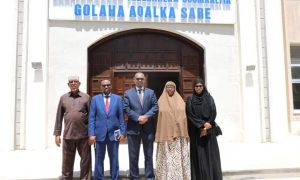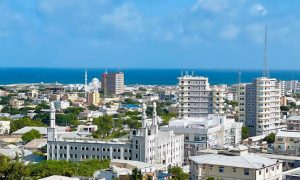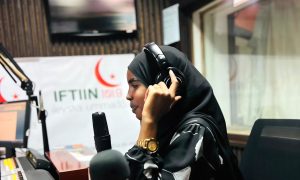

By: Fatuma Lamungu Nur
( January 7, 2016, New York City, Sri Lanka Guardian) The Ethiopian forces are pouring en masse into the port town of Kismayo in southern Somalia.
Ahmed Madobe, the clan leader of Kismayo backed by Kenya and Ethiopia has recently announced a military operation named “Jubba River’’, which he said was aimed at flushing out Al Shabab from Jubba Valley.
This is far from the reality, since the truth behind this operation is to displace the indigenous people in Jubba River and to pave the way for the resettlement of Ogadeni people from Ethiopia and Kenya.
About then thousand families of the Ogaden clan are ready to be resettled in Jubba River, and this will allow the Ethiopian government to breathe and create some sort of stability in Ethiopia’s Zone Five region, where Ogaden National Liberation Front (ONLF) is fighting with the Addis Ababa regime.
Ethiopia has so far succeeded to divide the ONLF, by signing a peace agreements with some of them, and harbouring others to Jubba ,where they were handed the top leadership of the region. Ahmed Madobe, the leader of the Interim Jubba Administration, is among the former ONLF members, who were born in Ethiopia’s Zone Five region.
The concern of the indigenous people over the settlement of the new comers of the Ogaden clan members was featured in the UN Monitoring Group Report of Somalia and Eritrea (2015). The report suggested about the clandestine plan of Ethiopia to uproot the people of Jubba and reward the land to Ogadeni people from Ethiopia and Kenya.
By doing this, Ethiopia is not only expecting stability and a good relationship with the Ogadenis, but it has an agenda of creating an everlasting conflict between the Ogaden and the rest of the Somali clans. The relationship between the Ogaden clan and other Somali clans was never been easy, and the forceful plans to settle them in Somaliland, Hiiraan and other regions were violently opposed.
This plan is jeopardizing Somalia’s future stability, since Kenya another regional force is also trying to solidify its influence in Kismayo, and it’s openly opposing the role of Ethiopian forces in Kismayo.
The Ethiopian forces are boasting that they are in Kismayo to finish the job the Kenyans could not finish for the last five years, and the success of Addis Ababa in Jubba will raise many questions about the capability of Kenyan forces and the political role of the Nairobi regime in the Horn of Africa region.
When the ill-advised journey of Kenyan forces and Somali clan militants to invade Jubba Valley in southern Somalia began in 2011, no one expected a lasting positive result.
The cheap argument of the Kenyans was to stop Al Shabab from undermining the security of Kenya’s territory and borders, while the genuine agenda backed by clan driven Somali-Kenyan politicians was to create a clan enclave in southern Somalia for their own interests.
The sophisticated arms and funds used in this operation made everyone to believe that it will not take more than two weeks or a maximum of a month to flush out AlShabaab from the entire Jubba Valley.
But the story turned out differently, since the Kenyan forces (first timers on such battle-grounds since their formation five decades ago) were lacking the experience and the capacity to finish the job. It took more than one year for the Kenyan forces and the Somali clan militants to capture Kismayo, which became their last destination of the Jubba Valley dream, leaving the vast land in the region in the hands of Al Shabab.
The people in Jubba region are known for their peace loving attitude, but the bitter scars left on them by Al Shabab and clan warlords made them to be in a mood of self-defence, while the local communities became concerned about the activities of the foreign forces in collaboration with the Ogaden clan.
When the local people began the uprising against the Ogadeni militants in Kismayo in 2013, the Kenyan forces used all sorts of artilleries to silence them. Now and during this ow planned “Operation Jubba River”, it’s obvious that the Ethiopians and the Ogadeni militants will brand everyone in the area as Al Shabab member or as a pro Al Shabab person, so that the agenda of removing the indigenous people will be easy and justified.
The Somali government, AMISOM, UNSOM and the rest of the international community are all aware of these atrocities and the hidden agenda of this operation, but they will never comment since every one of them has his own interest in this project.
However, we are no longer in the 1960ties and – Praise to God – everyone in Somali today understands his or her basic rights and how to obtain them. Rights have never been obtained by peace, but shedding sacred blood to achieve the blessed goal.
My advice to the people of Gosha and entire Jubba is to support any genuine and inclusive peace process, but to stand firm and resist against invasion and take up arms to defend their lands.
(*) The author Drs Fatuma Lamungu Nur is a PHD holder in international politics and based in New York, USA
_____________________________________________________________________________________Xafiiska Wararka Qaranimo Online | Mogadishu, Somalia
_____________________________________________________________________________________Advertisement
_____________________________________________________________________________________






